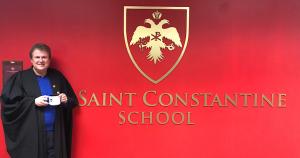 I am from West Virginia, a part of the United States with a proud culture, but not much financial wealth. We created beauty in our music, worship, and handicrafts. Granny Reynolds made quilts whose worth could not be measured in dollars.
I am from West Virginia, a part of the United States with a proud culture, but not much financial wealth. We created beauty in our music, worship, and handicrafts. Granny Reynolds made quilts whose worth could not be measured in dollars.
Yet my grandparents did not learn to make furniture, smith nails, quilt, or cook meals for artistic reasons. They learned at first, because of necessity. If you wished nails to repair the house, then you fired up the small forge and made them. Those nails that were still around when I was a boy that Papaw had made were fascinating, each crafted and unique, so different than those we bought at the hardware store. Still, I never learned to make nails because they became so cheap that the time was better spent elsewhere.
This was, on the whole, a great blessing. Nana always would remind me of how hard the life was in the country. Good came of the hard times of the Depression, but nobody who lived through them ever pined for the days to come again. My Nana loved the city in part, she would say to me, because she could live near a street light that without work or cost gave her light all night for free.
Rising affluence is a blessing, but for all of us (including our students) also a curse. One needs only read Sacred Scripture to see that the love of things and money can be a root of all kinds of evils and so keep us from the Kingdom of God. Increased affluence and consumption has many great social and environmental consequences, but also personal and educational issues that are sometimes harder to see because they are smaller.
Many of us who teach are working with students who compared to human history have more wealth, greater educational opportunity, and access to things than all but a very few who have lived. Our students at The College and The Saint Constantine School come from very diverse backgrounds and socio-economic levels. We turn nobody away for inability to pay, but they are privileged relative to the global population and history. We must teach them lessons that in the past would have been valuable only to the upper classes.
Growing up, my grandparents could not choose to indulge most desires. They could not buy most of what they wished to own. Treats were for holidays as were rare gifts. There was little free time. As a result, they were protected from vices related to indulgences or material goods, though they did not learn the particular virtues that wealthier had to practice.
Creativity was a necessity to many, because if they could not innovate, then they would suffer. In America, private schools often lead in innovation, because we cannot just spend our way out of problems. We learn that there are (often) two approaches to a difficulty: the budget or the brain! Even if we have the funding, we often hesitate to see if there is some new more creative solution that costs less or even nothing.
For example, my son was faced with needing an activity to do with a group of younger students at The School. He had no budget and this forced him to become creative. He turned to games he had played as a young man using cardboard in boxes that were being thrown away, and the sticks that were laying around our playground. By the time he was done, he had invented Alexander the Great Day, helping children make shields and spears, training them in the phalanx, and much merriment resulted.
This was good for our School, because of the creativity involved and the community that formed “making do” and finding their enjoyment in each other. If he had money, my son would have been tempted to buy a kit of educational activities. These might, in fact, have had better content, but they would have cost both Ian and our students the joy of an eccentric event that was just for them and from them.
The other mistake is that when something goes well in a materialistic society with some wealth, we try to market it. My son could have put together a kit so everyone could do an Alexander the Great Day. This would have been a great mistake! First, the merit of the project was that it fit a particular hole in our yearlong schedule of academically rigorous events. Cut off from that and the day might have been a mere time waster. Second, the joy that came from my son calling on old childhood loves, memories, and games is not replicable.
Most of the best educational moments are not repeatable and this is why schools and colleges sometimes spend more money and do not get better results.
Being professional is good, but in a consumer culture “professionalism” sometimes is used to hide buying things. There is an educational consumerism that delights in junkets, consultants, expensive programs, and ever changing curriculum.
Of course, most of our schools do not have enough resources. There can be so little that no amount of creativity can compensate. Often teachers are too exhausted or overworked to joyously create. However, if there is any solution to this issue, then it must begin by taking any financial resources we do get and investing it in people: teachers and students.
American Colleges often use adjunct professors who are forced to teach at multiple institutions, barely making ends meet. These same schools will have infrastructure, technology, and resources that are world class used to “sell the school” to students. Education suffers, because the critical human element in education, the mentoring of the student by the professor, cannot flourish. A fancy coffee lounge cannot compensate for a professor with no time to do adequate office hours.
Schooling, at least in most of the American context, must turn all of our minds from acquisition to creation. The Godward gaze of the Orthodox classical Christian school is radically opposed to looking to the acquisition of stuff for happiness. The disciplines of the Church calendar help us. Lent comes and though many of us can afford to buy what we wish to eat, we are told not to eat it. This is very good for the soul today.
Moderation, prudential use of money and things, may be the chief virtue all of us need. For example, in my grandparent’s childhood most of the homes of West Virginia had no easy access to light and heat. Families sat together in the evening because they had to do so. This necessity came with many goods. When electricity made heat and light cheaper, this was mostly better, yet accidentally some closeness was lost.
We can do things separated from each other in different rooms. We can all put in earbuds and isolate ourselves from common sounds, giving our life the soundtrack we choose. Whatever the merits of those acts, we can also choose to gather together, take out the earbuds, and gain the old goods of community and commonality without the hardships of less wealth.
As much as possible, schools and colleges must work to create the “beloved community.” This community is formed by having as many common experiences as possible. The wealthy student and the student who has little wealth is brought to a common ground as much as possible.
A culture with wealth allows for maximum individualization and there is great good and blessing in this. However, schools that have students with that blessing must also bring together the community in a common culture. This is where the common traditions of the School help. Even though we are a very young school, The Saint Constantine School, creates events that do not center on individuals, but the beloved community. Our graduations, for example, center on the community and not merely the graduates.
The ability to have more is the ability to have enough and this is a great blessing. Immoderation becomes a temptation, but one that the disciplines of the Orthodox Way can help us overcome.










